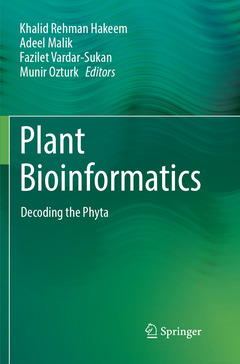Plant Bioinformatics, 1st ed. 2017 Decoding the Phyta
Coordonnateurs : Hakeem Khalid Rehman, Malik Adeel, Vardar-Sukan Fazilet, Ozturk Munir

This book: (i) introduces fundamental and applied bioinformatics research in the field of plant life sciences; (ii) enlightens the potential users towards the recent advances in the development and application of novel computational methods available for the analysis and integration of plant -omics data; (iii) highlights relevant databases, softwares, tools and web resources developed till date to make ease of access for researchers working to decipher plant responses towards stresses; and (iv) presents a critical cross-talks on the available high-throughput data in plant research. Therefore, in addition to being a reference for the professional researchers, it is also of great interest to students and their professors.
Considering immense significance of plants for all lives on Earth, the major focus of research in plant biology has been to: (a) select plants that best fit the purposes of human, (b) develop crop plants superior in quality, quantity and farming practices when compared to natural (wild) plants, and (c) explore strategies to help plants to adapt biotic and abiotic/environmental stress factors. Accordingly the development of novel techniques and their applications have increased significantly in recent years. In particular, large amount of biological data have emerged from multi-omics approaches aimed at addressing numerous aspects of the plant systems under biotic or abiotic stresses. However, even though the field is evolving at a rapid pace, information on the cross-talks and/or critical digestion of research outcomes in the context of plant bioinformatics is scarce. ?Plant Bioinformatics: Decoding the Phyta? is aimed to bridge this gap.1. Introduction to fundamental and applied bioinformatics research in plant life sciences.- Concept, development and application of novel computational methods for the analysis and integration of –omics data.- 3. Impact of high-throughput techniques on plant translational research.- 4. Functional genomics approaches in plant research.- 5. Bioinformatical versus experimental analyses of small RNAs in plants.- 6. Systems analyses of plant functions.- 7. Phylogenetic analyses and whole genome duplication (WGD) events.- 8. Application of bioinformatics in agriculture, plant breeding and, improved complex traits (e.g. yield and quality).- 9. Application of bioinformatics in developing resistance against insects and harsh environments.- 10. Discovery of molecular markers such as single sequence repeats (SSRs) involved in gene mapping, molecular breeding and genetic diversity.- 11. Significance of bioinformatics in the new crop diseases-emergence.- 12. From genomics to the improved crop phenotype.- 13. Deciphering the effects of microbiome on plants using computational methods.- 14. Bioinformatics resources for plants.- 15. Recent Technological advances in plant bioinformatics.- 16. ‘Big Data’ challenges and future trends in plant bioinformatics research.
Excellent reference for students, teachers, and researchers interested in plant "multi-omics" studies
International experts share up-to-date research on plant stress adaptation
Practical guide for computational biology and big data analysis of crop plants
Includes supplementary material: sn.pub/extras
Date de parution : 09-2018
Ouvrage de 459 p.
15.5x23.5 cm
Date de parution : 11-2017
Ouvrage de 459 p.
15.5x23.5 cm
Thème de Plant Bioinformatics :
Ces ouvrages sont susceptibles de vous intéresser

Plant OMICS and Crop Breeding 148,11 €


